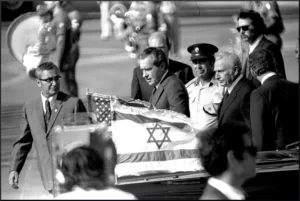Asa’ad AbuKhalil, published on Consortium News, March 3, 2023
Israeli Prime Minister Benjamin Netanyahu’s new book, Bibi: My Story, is an interesting and entertaining read for anyone who is comfortable with his or her own racism and with demonizing subject populations as inferior people.
If you don’t care about human rights violations and if you are a champion of war crimes, this book is for you.
Here is an Israeli leader who is proud of his violations of the laws of war (like blowing up Lebanese civilian planes in 1968) and he’s also proud of his racist restrictions against African immigrants because they are more prone to crime than other peoples, according to his account.
This book, like previous books by Netanyahu, will be read by American journalists and policy makers alike. Netanyahu was a junior diplomat when U.S. Secretary of State George Schultz would invite him for lengthy discussions about foreign policy and how to best subjugate Arabs.
 The book is useful in explaining how U.S. foreign policy is made in the Middle East. If an Arab were to write about the origins of U.S. Middle East policies and how Israeli leaders essentially formulate U.S. plans and policies for them, that person would be automatically accused of anti-Semitism.
The book is useful in explaining how U.S. foreign policy is made in the Middle East. If an Arab were to write about the origins of U.S. Middle East policies and how Israeli leaders essentially formulate U.S. plans and policies for them, that person would be automatically accused of anti-Semitism.
I believe Netanyahu when he claims many times in the book that his right-wing occupational vision was adopted by U.S. administrations. It is here that we learn that former President Donald Trump’s Abraham’s Accords actually started as an initiative by Netanyahu.
Netanyahu is famous (in Israel and in pro-Israeli Western countries) for his penchant to skirt the truth; lies, distortions and fabrications come easy to him.
Witness him in the book asserting that the 1967 war was inevitable because “the Arabs will go through with it” (p. 38) when it was Israel which launched that war. (In the early hours of the conflict, the Israeli government first tried to mislead the Johnson administration by falsely claiming that Egypt started it by firing the first shots).
Amused at the Flames
So proud is Netanyahu of the “mission” to “blow up” Lebanese civilian airliners in 1968 (the entire fleet of Lebanese airlines at the time) that he fabricates a keen inspection of the planes in the middle of the night, when the planes were parked and the airport closed, to ensure no civilians were on board before the operation took place. (p. 56).
He’s concocting a humanitarian veneer for his war crime. Netanyahu was amused how he saw the “airport…lit with enormous flames. It was like something out of a movie” (p. 56).
He casually mentions his brother was in the team that raided Beirut in 1973 (he wrongly gives the date as 1972) and killed Palestinian civilian and military leaders. He claims those leaders were plotting attacks on Israel (p. 93), when one of the victims was the poet, Kamal Nasser, who never held a gun in his life.
Thus began Netanyahu’s war on terrorism.

He underscores Jewish attachment to the land (including by European Jews who had never seen the holy land before) but he can’t understand the attachment of the Palestinian native population to their land. This is the crux of Zionist racism which still underpins Israel’s ongoing aggression against Palestinians.
Netanyahu’s analysis of U.S.-Israeli relations is simple: no matter what Israel does, and no matter how many wars and invasions it launches, the “alliance with the U.S. will take care of itself.” He correctly believes that U.S. presidents will stand by Israel no matter what, and that “everyone likes a winner” (p. 84).
But Israel does not win wars on its own; it fights — like Ukraine — with the entire Western world behind it. Netanyahu is right that since 1948, every U.S. president has stood by Israel no matter what, despite international public outrage.
Access to the Top
The book reveals the extent to which influential American Zionists can have access to the highest echelons of the U.S. government. Netanyahu’s father, a professor of Judaic studies at Cornell University at the time, decided he didn’t like U.S. foreign policy toward Israel in 1974. So he took his son to meet Eugene Rostow, formerly President Lyndon Johnson’s under-secretary of state for political affairs.
Rostow arranged for the two to meet with Paul Nitze and Admiral Elmo Zumwalt. Imagine that kind of access enjoyed by an Arab-American professor and his son? To this day, doors for Arab-Americans who disagree with U.S. foreign policy are closed shut. Only Arab-Americans willing to applaud U.S. wars and policy are welcomed in the halls of power.
Netanyahu’s father even met with General Dwight Eisenhower in 1947 to plead the rightist Israeli case with him. Eisenhower was “sufficiently impressed” so he asked him to “repeat his entire presentation to a full assembly of the army’s general staff” (p. 107).
Netanyahu mentions the time when Yitzhak Rabin, as Israeli ambassador to the U.S., was accused by historian Arthur Schlesinger Jr, of interfering in the American presidential election of 1972 on the side of Richard M. Nixon.

But Rabin’s interference was nowhere near as blatant and heavy handed as Netanyahu’s own intervention on the side of Republican presidential candidates. Fortunately, this has soured the attitudes of Democrats outside Congress towards Israel and tarnished Israel’s brand name.
Israel was a political product that both Democrats and Republicans, liberals and conservatives, were able to identify with. In today’s American politics, the Israeli political project — especially under Netanyahu — has become a cause of the right, and for the right — both in Israel and the U.S.
Contrary to the intentions of David Ben-Gurion, the nation’s founder, Israel has increasingly become a partisan political issue in the U.S., even though the Democratic Party leadership is too timid to reflect the feelings of rank-and-file Democrats on the subject of Israel. The leadership doesn’t care to stand up to the Israel lobby.
Beginnings in the US
In the 1980s, Netanyahu started working in the Israeli embassy in Washington. Naturally, he had access to the highest echelons of U.S. power. He admitted to recruiting people to produce pro-Israeli “op-eds debunking” criticisms of Israel (p. 149).
Netanyahu was a regular and desired guest on U.S. TV news programs. He tells readers American “camera crews” would give him the thumbs up after an appearance on ABC’s Nightline. Ted Koppel, the show’s host, was largely responsible for Netanyahu’s promotion.
Schultz, the secretary of state at the time, would call this mere staffer at the Israeli embassy to seek his opinion about U.S. foreign policy.
An Arab ambassador would wait months before given a few minutes audience with the Secretary of State. But Schultz shared important insights with Netanyahu; he told him in his first meeting about Palestinians: “These terrorists aren’t human beings. They are animals” (p. 153). Meanwhile, President Ronald Reagan was reading Netanyahu’s book on terrorism and handing it out to his aides.
Boasting Bibi
Netanyahu wants the reader to know that he was a military hero, and that he is a great intellectual and politician; and that he is also very funny and can make predictions. He tells us, for instance, that he foretold the collapse of the Soviet bloc, though no one is offered to support that claim.
Among the fabrications in the book is his babble about the Madrid Peace conference of 1991 and how he assembled Arab reporters and entertained questions from them, refuting all their arguments about the conflict.
No such press conference took place, and participants remember that Arab reporters actually boycotted press events of Israeli leaders and diplomats at the time.
Netanyahu claims that all Arab diplomats at the U.N. (where he was Israeli ambassador) are ignorant of the facts of the Middle East — when his book is riddled with mistakes, inaccuracies and falsehoods. He, for instance, claims the Prophet Muhammad’s own tribe was “a formidable Jewish tribe in Arabia” and that he, i.e., Muhammad, destroyed his own tribe. No mention was made by historian Netanyahu about how Muhammad was able to survive the destruction of his own tribe.
His racism is unmasked when he refers to the Palestinian native inhabitants of the holy land as mere “Arabs who pour[ed] in a steady stream of colonists” (p. 186). He asserts, audaciously, that “it is not the Jews who usurp the land from the Arabs, but the Arabs who usurp the land from the Jews. The Jews are the original natives, the Arabs are the colonists.”
Netanyahu draws on these wild ideas, for instance, in the universally discredited book, From Times Immemorial, by Joan Peters. And of course he cites Mark Twain who, during a visit to the holy land, didn’t think Arab peasants worthy of mention.
*Featured Image: May 15, 2011. Palestinians near El-Arrub, southwest of Bethlehem, getting tear gassed by Israeli forces after demonstrating against the illegal seizure of their land by Israeli settlers. (Israel Defense Forces, CC BY 2.0, Wikimedia Commons)
As`ad AbuKhalil is a Lebanese-American professor of political science at California State University, Stanislaus. He is the author of the Historical Dictionary of Lebanon (1998), Bin Laden, Islam and America’s New War on Terrorism (2002), The Battle for Saudi Arabia (2004) and ran the popular The Angry Arab blog. He tweets as @asadabukhalil
